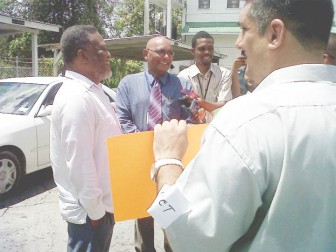Prime Minister Sam Hinds yesterday defended government’s decision to reduce the subsidy for power consumption in Linden, while denying that the move is a result of race-based politics.
Hinds was at the time addressing rights activists Mark Benschop and Freddie Kissoon along with Alliance For Change (AFC) members Gerhard Ramsaroop and Michael Carrington and Working People’s Alliance (WPA) executive Dr. David Hinds, who staged a picket in front his office. Their protest was a show of solidarity with Lindeners, who will be paying higher rates for electricity from July 1, with the reduction of the subsidy.

Despite mixed success by the governing party at making electoral inroads in Linden, the town and the region have traditionally been strongholds of the PNC. At last November’s polls, it voted overwhelmingly for opposition coalition APNU, of which the PNCR was the largest constituent.
Hinds, denying that the reduction of the subsidy was political, said yesterday that if Lindeners had voted overwhelmingly for the PPP/C in the November, 2011 elections, the government would have “cut out the subsidy faster.” He added that over the course of time the subsidy to Lindeners would have had to go, so that the town could have been able to experience the same rates as the rest of the nation.
“The subsidy is not being removed totally. It is being reduced. And for us, Africans, there has been too much of a propagation of this idea that we are depressed. The point I’m making is that – in my view – is that in our black communities there is constant propagation that we are depressed and dispossessed,” he said. “The people all over Guyana need to use their brains and arms to make a living,” he added, gesturing to his arms.
Kissoon, however, pointed out that while the government is putting a $4B subsidy into a predominantly East-Indian sugar industry, it was ending its subsidy to a predominantly Afro-Guyanese town. “I am saying given our racial turmoil, which is endemic in the racial psychology of this nation, you have to approach it most cautiously and you are subsidising an Indian enclave and cutting an African enclave which is not fair,” Kissoon stated.
In rebuttal, Hinds stated that government takes different approaches to the sugar industry and he noted that during former President Bharrat Jagdeo’s last term in office it was signalled that should the sugar workers not show an active interest in the industry all subsidies would cease. “I could refer to two or three Enmore Martyrs [observations] ago, our former president Jagdeo had said that to even [sugar workers’ union president] Komal Chand, that he (Chand) did speak about one side, he didn’t speak about the other side, which was the turnout of the workers, and he did say that if they did not turn out it would fall apart,” he said.
‘Not fair’
When questioned about rejecting a proposal to sit down with the residents of Linden and Region 10 Chairman Sharma Solomon, who was on the phone with Benschop during the meeting, Hinds stated that they have not rejected the proposal to talk with the people of Linden in the presence of members of the two major opposition parties.
He noted that he was concerned about the path and the outcome of a meeting with the Lindeners, but added that he is willing to go once he is invited by the Regional Chairman and protection for him is provided. “I am willing to discuss with the Chairman of Region Ten how the $1,800M would be spent on subsidy of electricity to Linden,” he said.
When asked, by Benschop why the government did not consult with the people of Linden before imposing the hike, he stated that the government had to lead the way in putting a system in place to reduce the subsidy. He added that he would have been happy if, at a consultation, Lindeners acknowledged the fact that the entire country has been subsiding every household there to a tune of $204,000 per year and then say that it is not fair that they have to pay an increase in their electricity rates.
Hinds added that while the subsidy for Linden reached to $2.6B last year, that only allowed the residents to waste the power and noted that no government would do such. “Such a situation also comes about because of the very low charges; 90% or more subsidies that economically leads to certain things like leaving lights on and the consumption of power in Linden is three times what it is for similar households in the country,” he noted.
When it was suggested to Hinds that approximately 70% of residents in Linden are unemployed, he stated that he was unaware of such a figure.
Solomon via telephone asked why Guyanese have to pay ridiculously high prices for electricity. “The price of electricity is determined largely by the fuel that is coming in. And a poor country like us go to buy and we pay the same for oil like the other countries with better economies,” he explained, adding that the last two to three shipments of oil for the Guyana Power and Light Company had to be delayed over a few hours because payments were stalled.
“Monies have to be paid to keep the oil moving and one of the things we could have contemplated is that we have $1,800M being put to subsidise electricity in Linden this year and we would use that and when it’s finished we will say money done and we all sit down on our hands,” he added.
Hinds was applauded by the five protesters for taking time to go out and listen to their concerns and providing some answers that would be of some benefit to them.





